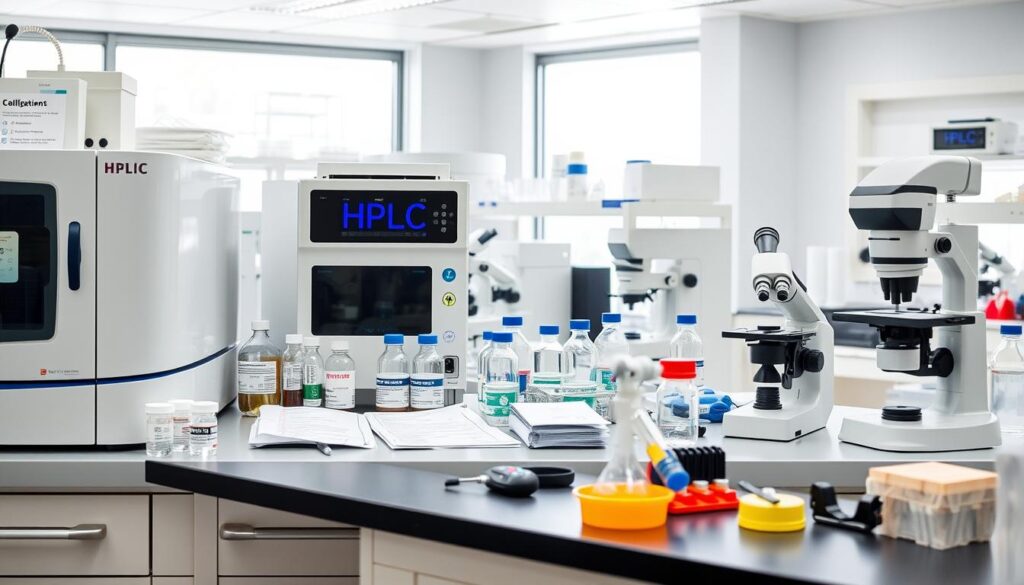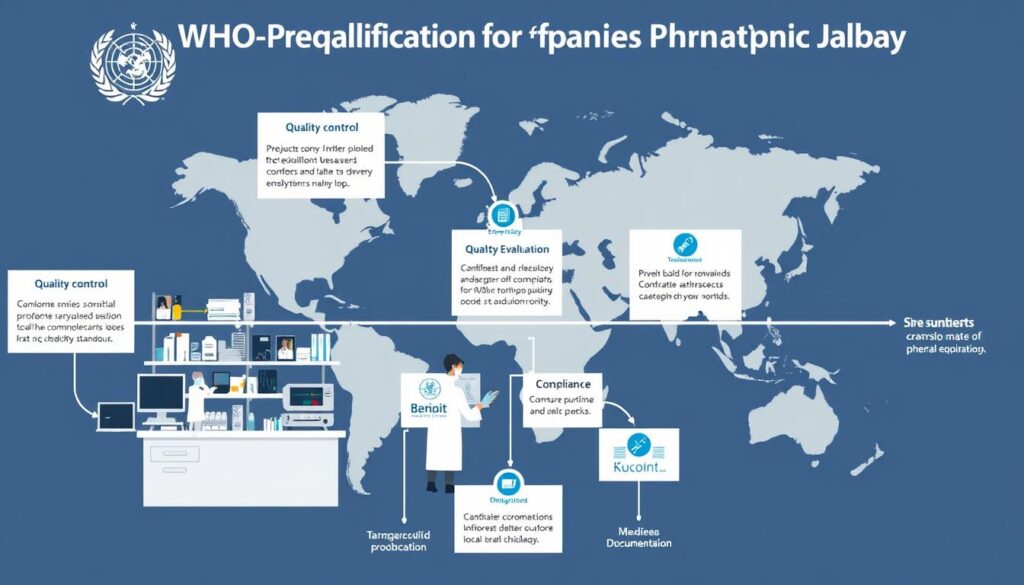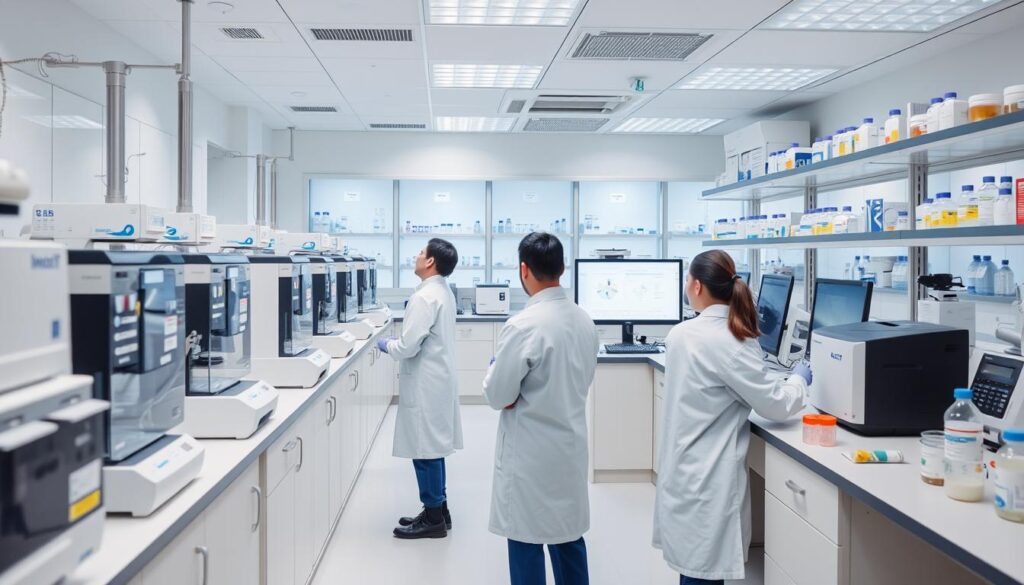
WHO Prequalification Tips for Pharmaceutical Analytical Labs: Complete Guide
As a pharmaceutical analytical lab, you know how vital it is to follow WHO prequalification guidelines. These guidelines help ensure your products are safe and effective. The World Health Organization’s prequalification program checks pharmaceutical products. It’s key to follow WHO prequalification tips for your lab to get accredited.
Understanding the WHO prequalification process is important. By following the right tips, your products will meet high standards. This guide will help you through the prequalification process and get WHO prequalification.
Key Takeaways
- WHO prequalification is a standardized process that evaluates pharmaceutical products for quality, safety, and efficacy.
- Following tips for WHO prequalification of pharmaceutical analytical laboratories is critical to achieve accreditation.
- Pharmaceutical laboratory standards are strict, and sticking to WHO prequalification guidelines is essential.
- WHO prequalification requires following WHO Good Manufacturing Practice (GMP) for manufacturers and WHO Good Practices for Pharmaceutical Quality Control Laboratories for QCLs.
- WHO provides technical assistance to help manufacturers meet international standards.
- WHO prequalification guidelines are vital for ensuring the quality, safety, and efficacy of pharmaceutical products.
Understanding WHO Prequalification for Pharmaceutical Laboratories
Exploring the world of pharmaceutical labs means knowing about WHO prequalification. This process checks if pharmaceutical products meet international standards. It’s key to making sure products are safe and work well.
Quality control in labs is a big part of this. Following WHO PQP rules is very important.
Testing is a big deal in prequalification. Labs use methods like HPLC and UV/VIS spectrophotometry. This ensures products are of high quality. WHO also checks labs to make sure they follow the right practices.

- Regular inspections to ensure compliance with international standards
- Adherence to WHO PQP requirements
- Conducting analytical tests using various techniques
- Ensuring quality control in pharmaceutical labs
Knowing about WHO prequalification helps labs make sure their products are good. This protects people’s health and stops bad products from being sold.
Essential Requirements for WHO PQP Compliance
To meet the World Health Organization’s (WHO) Prequalification Program (PQP) standards, labs must follow certain rules. They need to have validated equipment, follow good lab practices, and validate their analytical methods. These steps are key to ensuring test results are accurate and reliable.
Some important things to remember for WHO PQP compliance include:
- Lab equipment validation: This means checking that all lab equipment is set up right, calibrated, and kept in good shape for precise results.
- Good laboratory practices: These practices are vital for the quality and integrity of lab data. They cover how to handle samples, conduct tests, and report data.
- Analytical method validation: This step confirms that testing and analysis methods are dependable, precise, and meet global standards.
By fulfilling these key requirements, labs can make sure their test results are trustworthy. This is essential for the prequalification of medicines. It also ensures the safety and effectiveness of medicines in countries with limited resources.

Following WHO PQP rules is not just for labs but also for medicine makers. By making sure their products meet global standards, manufacturers can make their medicines available in countries with fewer resources. This can greatly improve health outcomes for people there.
Laboratory Infrastructure and Equipment Standards
Understanding the infrastructure and equipment standards is key for who prequalification pharmaceutical labs. The World Health Organization (WHO) sets guidelines for these aspects. This ensures labs are ready for their tasks. For an analytical laboratory, following these standards is vital for good work.
The design and layout of a lab are very important. A well-planned lab improves workflow and cuts down on mistakes. It also boosts productivity. Plus, lab equipment must be checked and validated often. This is critical for labs that test drugs, as accurate results are vital for public health.
Some important things to think about for lab setup and equipment include:
- Following WHO standards for lab design and layout
- Regularly calibrating and validating equipment
- Having qualified and trained staff
- Using a quality management system
By sticking to these standards, labs can make sure their test results are reliable. This is key for labs that test drugs. It helps ensure the quality of medicines and keeps people safe.
Quality Management System Implementation
Pharmaceutical labs need a quality management system (QMS) for ongoing improvement and WHO compliance. A QMS includes policies, procedures, and processes for maintaining quality. WHO prequalification labs require this to meet quality standards for testing.
WHO standards for labs include a QMS with document control, internal audits, and corrective actions. Labs must also participate in proficiency testing and collaborative trials. Seeking ISO/IEC 17025 accreditation is encouraged by WHO for better evaluation.
- Document control: Labs must manage their documents, like SOPs and test methods.
- Internal audits: Regular audits are needed to check QMS effectiveness and WHO compliance.
- Corrective action: Labs must have a way to handle any non-conformities or deviations.
Implementing a QMS helps labs meet WHO prequalification standards. This ensures high-quality testing services for clients. Labs show their commitment to quality and international standards by doing this.
Tips for WHO Prequalification of Pharmaceutical Analytical Laboratories
When getting ready for WHO prequalification, it’s key to follow all guidelines and standards. This includes those for lab operations and quality management. WHO lab prequalification guidance is very important. It helps labs meet the needed standards.
To get WHO prequalification, labs must follow ISO/IEC 17025:2017 and ISO 15189:2012. The auditing process uses ISO 19011:2018 principles. Here are some important tips:
- Make sure your lab has a strong quality management system.
- Do regular internal audits to find areas to get better.
- Keep training and checking the skills of your staff.
- Keep detailed records of all lab work.
By following these tips and WHO lab prequalification guidance, labs can meet WHO standards. This is important for labs that want to join WHO prequalification monitoring projects. These projects check the quality of medicines bought by UN agencies.
Quality control labs (QCLs) that get WHO prequalification can join these projects. They focus on certain health areas and check both WHO-prequalified and non-WHO-prequalified medicines. By following WHO lab prequalification guidance, labs can offer top-quality services. They help improve public health worldwide.
Method Validation and Testing Procedures
Getting WHO pharmaceutical lab certification means you must know about method validation and testing. It’s key for ensuring your lab’s quality. The WHO and ICH guidelines help with this, covering things like accuracy and precision.
To get WHO certification, follow the ICH guidelines closely. This means doing experiments to prove your methods work. It’s also important to show you can make high-quality products consistently.
- Accuracy: The ability of the method to produce results that are close to the true value
- Precision: The ability of the method to produce consistent results
- Specificity: The ability of the method to distinguish between different substances
- Linearity: The ability of the method to produce results that are directly proportional to the concentration of the substance being measured
By validating your methods according to ICH guidelines, you show your dedication to quality. This boosts your chances of getting WHO prequalification. Keep detailed records of your experiments and results. They’re vital for your submission package.
Documentation and Record-Keeping Best Practices
Keeping accurate and detailed records is key for WHO prequalification. It shows you follow the necessary guidelines and standards. A checklist for prequalification can help make sure you have all the right documents.
Good Documentation Practices (GDP) are important. They help track who did what and when. The ALCOA+ principles ensure records are trustworthy and reliable.
Here are some tips for better documentation and record-keeping:
- Write records as soon as you do something
- Sign and date any changes to original entries
- Keep records as long as the law requires
- Use a checklist to check if you’re following the rules
By following these tips and using a checklist, labs can meet WHO prequalification standards. This ensures their records are up to par.
Staff Training and Competency Requirements
Ensuring staff competency is key in pharmaceutical labs. WHO prequalification demands that staff are well-trained and skilled. A WHO audit checks if staff can do their jobs well.
The accreditation process has several steps. These include initial enquiry, dossier evaluation, audit, and decision. Labs must follow ISO/IEC 17025 to show staff competence. This standard covers auditing skills, education, and experience.
Important aspects of staff training and competency include:
- Continuous learning in pharmaceutical and regulatory sciences
- Education based on competency to fill training gaps
- Tools like self-appraisals and external assessments to check performance
A WHO audit will look at these areas to ensure labs meet standards. By following accreditation tips and ensuring staff competence, labs can stay compliant and succeed in WHO prequalification.
Common Challenges and Solutions in WHO Prequalification
When you’re in the WHO prequalification process, you might face some hurdles. Knowing the WHO lab prequalification criteria and having the right who prequalification lab documentation are key. Issues with documentation and standards compliance are common problems.
To tackle these issues, make sure your lab meets the standards. Also, ensure all your documentation is correct. This means having a good quality management system and training your staff well.
Understanding the WHO prequalification process and the needed documentation is vital. You should know the WHO lab prequalification criteria well. Also, make sure your lab follows all relevant standards.
- Ensure that your laboratory meets the required standards
- Have a good quality management system in place
- Ensure that all staff members are properly trained and competent
- Have accurate and complete who prequalification lab documentation
By solving these challenges and following the WHO lab prequalification criteria, you can do well. This way, you can offer high-quality products. These products will help improve public health outcomes.
Maintaining Compliance Post-Qualification
After getting WHO prequalification, keeping up with WHO standards is key. This ensures your lab keeps running smoothly and products stay high quality. Follow WHO prequalification guidelines and tips for labs to stay on track.
Improvement and watching your lab’s performance are vital. Focus on quality assurance, regular audits, and training your staff. Also, have a plan for dealing with any issues that don’t meet standards. This way, your lab will keep up with WHO rules and make top-notch products.
Also, keep current with new WHO guidelines. This means following the WHO Model Quality Assurance System and setting up checks before products are made. Staying compliant with WHO helps keep products safe and healthy for everyone.
- Implement quality assurance policies
- Conduct regular audits
- Provide staff training and competency requirements
- Establish a system for reporting and addressing non-compliance incidents
By taking these steps and following WHO prequalification tips, your lab will stay compliant. This ensures the quality and safety of your products.
Conclusion: Ensuring Long-term Success in WHO Prequalification
Getting WHO prequalification is a big win for pharmaceutical labs. But, it’s just the start. To keep up, you must follow strict standards, use the best testing methods, and keep quality high.
The journey to prequalification never ends. Keep your quality system sharp, update your documents often, and train your staff well. This way, your lab stays a key player in the global market.
Remember, you’re not alone in the WHO prequalification journey. Use industry help, work with regulators, and find mentors. With hard work and a focus on quality, your lab will lead in pharmaceutical testing for many years.
FAQ
What is the importance of WHO prequalification for pharmaceutical analytical laboratories?
WHO prequalification makes sure pharmaceutical products are safe and work well. It’s key for labs to follow WHO rules to show they can test accurately.
What are the critical requirements for laboratories to comply with WHO PQP?
Labs need to be accredited, have validated equipment, and follow good practices. They must also validate their methods to ensure test results are reliable.
What are the standards for laboratory infrastructure and equipment in the context of WHO prequalification?
Labs must meet WHO standards for design, layout, and equipment. This ensures they work efficiently and effectively.
Why is a quality management system (QMS) important for pharmaceutical laboratories in the WHO prequalification process?
A QMS helps labs maintain quality and follow WHO rules. It’s vital for meeting prequalification standards.
What are the practical tips for pharmaceutical analytical laboratories preparing for WHO prequalification?
Labs should follow WHO guidelines and ensure they meet lab standards. This helps them succeed in the prequalification process.
How does method validation and testing procedures contribute to the WHO prequalification of pharmaceutical analytical laboratories?
Strong method validation and testing are key. They ensure analytical results are reliable, which is essential for WHO prequalification.
What are the best practices for documentation and record-keeping in pharmaceutical laboratories for WHO prequalification?
Labs must keep accurate records as per WHO guidelines. This shows they meet prequalification standards.
What are the staff training and competency requirements for pharmaceutical laboratories seeking WHO prequalification?
Staff must be skilled to do their jobs. This is checked through WHO accreditation and audits.
What are the common challenges that pharmaceutical laboratories may face during the WHO prequalification process, and how can they be addressed?
Labs need to understand WHO criteria and keep detailed records. This helps overcome prequalification challenges.
How can pharmaceutical laboratories maintain compliance with WHO standards after achieving prequalification?
Labs should always improve, monitor, and follow WHO guidelines. This keeps them compliant and successful in the long run.
